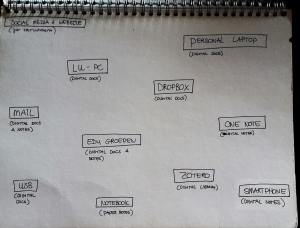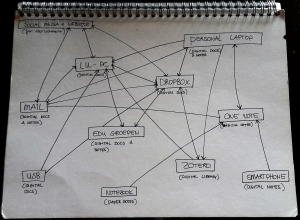Although many of my friends keep asking me “How do you do this [PhD]?!” (and I keep thinking: Doing what? I just started and I ‘still’ like it…), this post won’t be about self-discipline, self-management, self-reflection, multi-tasking, meta-cognition or another kind of a PhD students’ conditional characteristic.* I enjoyed reading my colleague’s blog on being a PhD student (https://researchblog.iclon.nl/planning-everything-reading-writing-still/) and I could probably write another ten pages about this topic. However, what I chose to share with you today are my experiences with working in an inter-university research project so far.
It has been only 4,5 months since I started my PhD at ICLON. My PhD track is, just like many other PhD tracks, comparable to a (lonely) life on a private island. However, what makes my project less lonely (or less independent), are the people involved in this project; stakeholders so to say. As your research develops, more and more people will get involved. Probably every PhD student will get to the point of receiving feedback from various people with different perspectives, different goals in mind, or at least different pathways leading towards a certain goal. The starting point of my research project is: 3 universities, 3 interdependent projects, and 9 interdependent researchers. Yes: N-i-n-e. I thought it would be nice to tell you a little bit about my who-what-were-when-dilemmas a.k.a. Prepare for humdrum Drag (PhD). Note (!!!): This is not a manual including Do’s and Don’ts but simply a description of my thoughts. It also isn’t a genuine portrayal of reality but rather an exaggerated sarcastic one.
- WHO’s the lucky one? Collaboration. I find it an intriguing phenomena as its process is dependent upon so many different factors. Among others: Expectation management. The projects we’re working on is interdependent in the sense that we’re dependent on each other’s data. This is a good thing, from a sharing-interests-perspective, as a smooth collection of data is close to everyone’s heart. However, from a responsibility-perspective it’s a little bit more complicated. Who’s doing what, where, and when? In other words: Who feels responsible? Me. For everything. Duh, that’s why I’m a PhD student (did somebody say control freak?).
- WHAT are you talking about? Something can make perfect sense to me and make no sense to others at the same time. It has only been 4,5 months since I started and I already get the feeling of being a puzzled researcher in a world of my own. What I mean to say is; Research is a process in one’s head. Before concrete products appear (such as a theoretical framework, concrete measurement instruments, or even black on white results), we think, read, rethink, reread, etcetera. As a result, meetings so far exist of brain-storming, weighting pros and cons, reformulating ideas, etcetera. In other words, the challenge is to translate our personal thinking process of, let’s say four weeks, to a meeting of two hours (with 8 other researchers also having their own thoughts).
I finally got to understand Bieber
- WHERE? A picture can say a thousand words…
Where to save files & notes?
Where to synchronize latest versions to?
- WHEN: To mail or not to mail? I think this type of humdrum drag is comparable to the Dutch saying “He shot all his gunpowder” (Hij heeft al zijn kruit verschoten). On a normal working day several issues will cross your mind that you would like to discuss with others. Will you decide to wait and think about it yourself for a couple of hours or days more? Or will you mail your colleagues and ask for their input? In the latter case, be aware that 1) This may result in a day of mailing back and forth without actually moving forward (my personal record is 21 mails of 7 people within 2 hours on 1 specific topic), or 2) Your colleagues will be fed up with your e-mails and won’t respond to your e-mails a second time.
* I realize that, in the end, I actually did write about it…







Recent Comments